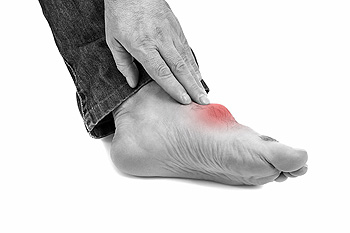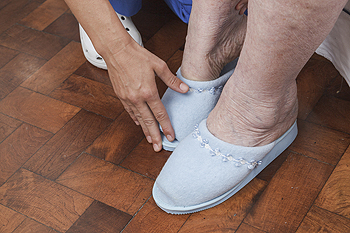Blog
Proper Dieting for Patients with Gout
 When uric acid crystals buildup in the joints, gout can occur. Gout can be a very painful condition that causes joints to become inflamed or swollen. Gout can affect any joint in the body, but the most common joint affected is the big toe. While there are numerous causes for gout, consuming high purine foods like red meat, seafood, and alcohol, can be attributing factors for why uric acid buildups occur. Therefore, patients who are suffering from gout flare ups should drink plenty of water, as well as adjust their diet to include vegetables and low fat dairy foods. Although there is no cure for gout, getting to and maintaining a healthy weight can help reduce your risk for gout flare-ups. If you are suffering from gout, it is highly recommended to be under the care of a podiatrist in order to properly manage this condition.
When uric acid crystals buildup in the joints, gout can occur. Gout can be a very painful condition that causes joints to become inflamed or swollen. Gout can affect any joint in the body, but the most common joint affected is the big toe. While there are numerous causes for gout, consuming high purine foods like red meat, seafood, and alcohol, can be attributing factors for why uric acid buildups occur. Therefore, patients who are suffering from gout flare ups should drink plenty of water, as well as adjust their diet to include vegetables and low fat dairy foods. Although there is no cure for gout, getting to and maintaining a healthy weight can help reduce your risk for gout flare-ups. If you are suffering from gout, it is highly recommended to be under the care of a podiatrist in order to properly manage this condition.
Gout is a painful condition that can be treated. If you are seeking treatment, contact one of our podiatrists from Pennsylvania. Our doctors will treat your foot and ankle needs.
What Is Gout?
Gout is a form of arthritis that is characterized by sudden, severe attacks of pain, redness, and tenderness in the joints. The condition usually affects the joint at the base of the big toe. A gout attack can occur at any random time, such as the middle of the night while you are asleep.
Symptoms
- Intense Joint Pain - Usually around the large joint of your big toe, and it most severe within the first four to twelve hours
- Lingering Discomfort - Joint discomfort may last from a few days to a few weeks
- Inflammation and Redness -Affected joints may become swollen, tender, warm and red
- Limited Range of Motion - May experience a decrease in joint mobility
Risk Factors
- Genetics - If family members have gout, you’re more likely to have it
- Medications - Diuretic medications can raise uric acid levels
- Gender/Age - Gout is more common in men until the age of 60. It is believed that estrogen protects women until that point
- Diet - Eating red meat and shellfish increases your risk
- Alcohol - Having more than two alcoholic drinks per day increases your risk
- Obesity - Obese people are at a higher risk for gout
Prior to visiting your podiatrist to receive treatment for gout, there are a few things you should do beforehand. If you have gout you should write down your symptoms--including when they started and how often you experience them, important medical information you may have, and any questions you may have. Writing down these three things will help your podiatrist in assessing your specific situation so that he or she may provide the best route of treatment for you.
If you have any questions, please feel free to contact one of our offices located in Plymouth Meeting and Ambler, PA . We offer the newest diagnostic and treatment technologies for all your foot care needs.
Washing, Drying, and Inspecting Elderly Feet
 As the aging process occurs, the importance of maintaining proper foot care becomes evident as certain foot conditions can develop. This begins with washing and drying the feet thoroughly, which may help to prevent infections from occurring. When the feet are frequently inspected, cuts, wounds, and bruises can be easily detected. Circulation may improve when the feet are elevated while sleeping. Additionally, it is beneficial to wear shoes that have extra cushioning, which may be helpful in reducing existing foot pain. If you would like more information about how to take care of an elderly person’s feet, it is suggested that you consult with a podiatrist who can provide useful tips for everyday foot care.
As the aging process occurs, the importance of maintaining proper foot care becomes evident as certain foot conditions can develop. This begins with washing and drying the feet thoroughly, which may help to prevent infections from occurring. When the feet are frequently inspected, cuts, wounds, and bruises can be easily detected. Circulation may improve when the feet are elevated while sleeping. Additionally, it is beneficial to wear shoes that have extra cushioning, which may be helpful in reducing existing foot pain. If you would like more information about how to take care of an elderly person’s feet, it is suggested that you consult with a podiatrist who can provide useful tips for everyday foot care.
Proper foot care is something many older adults forget to consider. If you have any concerns about your feet and ankles, contact one of our podiatrists from Pennsylvania. Our doctors can provide the care you need to keep you pain-free and on your feet.
The Elderly and Their Feet
As we age we start to notice many changes in our body, but the elder population may not notice them right away. Medical conditions may prevent the elderly to take notice of their foot health right away. Poor vision is a lead contributor to not taking action for the elderly.
Common Conditions
- Neuropathy – can reduce feeling in the feet and can hide many life-threatening medical conditions.
- Reduced flexibility – prevents the ability of proper toenail trimming, and foot cleaning. If left untreated, it may lead to further medical issues.
- Foot sores – amongst the older population can be serious before they are discovered. Some of the problematic conditions they may face are:
- Gouging toenails affecting nearby toe
- Shoes that don’t fit properly
- Pressure sores
- Loss of circulation in legs & feet
- Edema & swelling of feet and ankles
Susceptible Infections
Diabetes and poor circulation can cause general loss of sensitivity over the years, turning a simple cut into a serious issue.
If you have any questions please feel free to contact one of our offices located in Plymouth Meeting and Ambler, PA . We offer the newest diagnostic and treatment technologies for all your foot and ankle needs.
Safety Methods That May Help to Prevent Falling
 Research has indicated that approximately one-third of people who are sixty-five years or older fall in their homes. Possible foot conditions can be prevented when measures are taken that can make the living environment safer. It is beneficial to inspect the home for worn carpets and dim lighting, followed by implementing techniques that can improve these conditions. Elderly patients may become stronger when gentle exercise and stretching routines are frequently performed, and this may help to prevent falling. When routine eye and physical examinations are completed, eyeglasses and existing medication can be updated. Many seniors find it safer to use grab bars in the toilet and shower areas, as this can promote stability which may help to prevent falling. Please consult with a podiatrist on how to avoid foot conditions from occurring from falling in the home.
Research has indicated that approximately one-third of people who are sixty-five years or older fall in their homes. Possible foot conditions can be prevented when measures are taken that can make the living environment safer. It is beneficial to inspect the home for worn carpets and dim lighting, followed by implementing techniques that can improve these conditions. Elderly patients may become stronger when gentle exercise and stretching routines are frequently performed, and this may help to prevent falling. When routine eye and physical examinations are completed, eyeglasses and existing medication can be updated. Many seniors find it safer to use grab bars in the toilet and shower areas, as this can promote stability which may help to prevent falling. Please consult with a podiatrist on how to avoid foot conditions from occurring from falling in the home.
Preventing falls among the elderly is very important. If you are older and have fallen or fear that you are prone to falling, consult with one of our podiatrists from Pennsylvania. Our doctors will assess your condition and provide you with quality advice and care.
Every 11 seconds, an elderly American is being treated in an emergency room for a fall related injury. Falls are the leading cause of head and hip injuries for those 65 and older. Due to decreases in strength, balance, senses, and lack of awareness, elderly persons are very susceptible to falling. Thankfully, there are a number of things older persons can do to prevent falls.
How to Prevent Falls
Some effective methods that older persons can do to prevent falls include:
- Enrolling in strength and balance exercise program to increase balance and strength
- Periodically having your sight and hearing checked
- Discuss any medications you have with a doctor to see if it increases the risk of falling
- Clearing the house of falling hazards and installing devices like grab bars and railings
- Utilizing a walker or cane
- Wearing shoes that provide good support and cushioning
- Talking to family members about falling and increasing awareness
Falling can be a traumatic and embarrassing experience for elderly persons; this can make them less willing to leave the house, and less willing to talk to someone about their fears of falling. Doing such things, however, will increase the likelihood of tripping or losing one’s balance. Knowing the causes of falling and how to prevent them is the best way to mitigate the risk of serious injury.
If you have any questions, please feel free to contact one of our offices located in Plymouth Meeting and Ambler, PA . We offer the newest diagnostic and treatment technologies for all your foot care needs.

